Many prestigious newspapers across the globe re-published a very interesting Associate Press article called ‘At soaring rate, Nepalis seeking jobs abroad come home dead’ on the plight of Nepali migrant workers in countries such as Malaysia, Korea, India and the Middle East. This article cited our co-author Nirmal Aryal who is a Nepali researcher based in New Zealand. This newspaper piece also quoted our recent paper ‘Injury and Mortality in Young Nepalese Migrant Workers: A Call for Public Health Action’, which was published earlier this year in the Asian-Pacific Journal of Public Health [1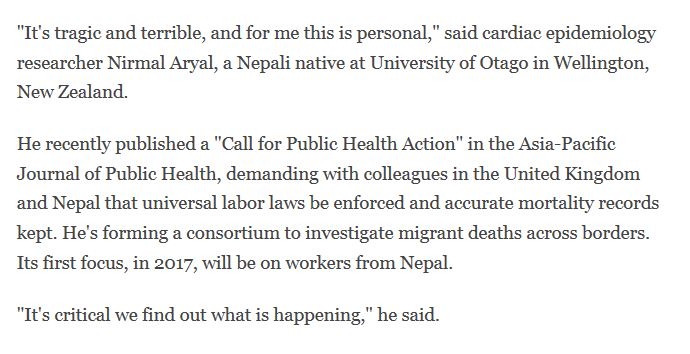 ]. This scientific journal has an Impact Factor of 1.72
]. This scientific journal has an Impact Factor of 1.72
We have received email message and tweets from colleagues and friends who spotted this article in newspapers in the United Kingdom, the United States, New Zealand (NZ), Taiwan, Nepal, India and many more countries as well as on several news websites. The article was sighted in North American papers such as The Washington Post, The New York Times, The Billings Gazette, Dothan Eagle, The Daily Times, The Roanoke Times, Union Times, The Daily Courier, The Journal Times, Medicine Hat News. and many more. Whilst in Britain the article can be found on the webpages of the Mail Online. In the Philippines the piece is on Inquirer.net
Elsewhere we were alerted to The Hindustan Times in India, which is incidently one of the few papers that changed the original title of the Associated Press piece to ‘Mysterious deaths: 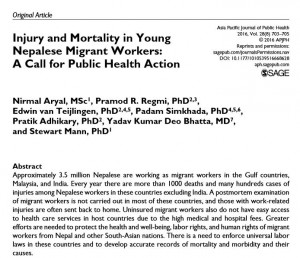 Nepalis working abroad come back home in caskets’. Furthermore, as our colleague Nirmal Aryal is based in NZ it is not surprising that several newspaper there reported on the issue: The New Zealand Herald, The Dominion Post (NZ), and as expected several English-language daily newspaper in Nepal picked up the story, including The Himalayan Times, and The Kathmandu Post.
Nepalis working abroad come back home in caskets’. Furthermore, as our colleague Nirmal Aryal is based in NZ it is not surprising that several newspaper there reported on the issue: The New Zealand Herald, The Dominion Post (NZ), and as expected several English-language daily newspaper in Nepal picked up the story, including The Himalayan Times, and The Kathmandu Post.
It’s a pity that the original Associated Press article only refers to the BU collaborators as ‘colleagues in the United Kingdom’. We have a long-standing interest in the health and well-being of Nepali migrant workers in various host countries. Dr. Pramod Regmi is post-doctoral research fellow in the Faculty of Health & Social Sciences (FHSS). He is part of the BU India-HUB, which involves the study of Nepali migrant workers in India. Prof. Padam Simkhada from Liverpool John Moores University is also BU Visiting Faculty in FHSS. Dr. Pratik Adhikary is a recent BU PhD graduate who has published several articles on Nepalis migrant workers [2-3]. Finally, our work on Nepali migrants has also been submitted as a contribution to the BU’s Global Festival of Learning.
Prof. Edwin van Teijlingen & Dr. Pramod Regmi
Faculty of Health & Social Sciences
References:
- Aryal, N., Regmi, P.R., van Teijlingen, E., Simkhada, P., Adhikary, P., Bhatta, Y.K.D., Mann, S. (2016) Injury and Mortality in Young Nepalese Migrant Workers: A Call for Public Health Action. Asian-Pacific Journal of Public Health 28(8): 703-705. DOI: http://dx.doi.org/10.1177/1010539516668628
- Adhikary, P., Simkhada, P.P., van Teijlingen E., Raja, AE. (2008) Health & Lifestyle of Nepalese Migrants in the UK BMC International Health & Human Rights 8(6). Web address: biomedcentral.com/1472-698X/8/6.
- Adhikary P., Keen S., van Teijlingen, E (2011) Health Issues among Nepalese migrant workers in Middle East. Health Science Journal 5: 169-175. hsj.gr/volume5/issue3/532.pdf
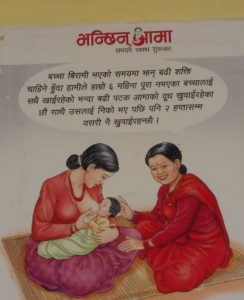 Yesterday we come down from Kathmandu, the capital of Nepal, to our THET training area in Nawalparasi. Today we are starting our sixth and last training session on the Mental health training for community-based maternity care providers. Interesting we are starting training on a Sunday as Nepal is largely a Hindu country and most workers have only a one-day weekend (which is the Saturday). This BU-led project is a collaboration between the Centre for Midwifery, Maternal & Perinatal Health (CMMPH), Tribhuvan University (Nepal’s oldest university) and Liverpool John Moores University (LJMU). The project receives funding from DFID, and is managed through THET and supported locally in Nepal by a charity Green Tara Nepal.
Yesterday we come down from Kathmandu, the capital of Nepal, to our THET training area in Nawalparasi. Today we are starting our sixth and last training session on the Mental health training for community-based maternity care providers. Interesting we are starting training on a Sunday as Nepal is largely a Hindu country and most workers have only a one-day weekend (which is the Saturday). This BU-led project is a collaboration between the Centre for Midwifery, Maternal & Perinatal Health (CMMPH), Tribhuvan University (Nepal’s oldest university) and Liverpool John Moores University (LJMU). The project receives funding from DFID, and is managed through THET and supported locally in Nepal by a charity Green Tara Nepal.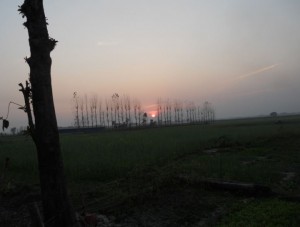 The landscape in the photo gives an idea of how rural this part of Nepal is. Nawalparasi is situated in the south of Nepal the India border. It is also largely very flat, not like the Nepal most people envisage namely that of the Himalayans and of Mount Everest. The flatness makes a Dutchman feel at home though.
The landscape in the photo gives an idea of how rural this part of Nepal is. Nawalparasi is situated in the south of Nepal the India border. It is also largely very flat, not like the Nepal most people envisage namely that of the Himalayans and of Mount Everest. The flatness makes a Dutchman feel at home though.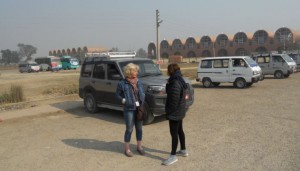
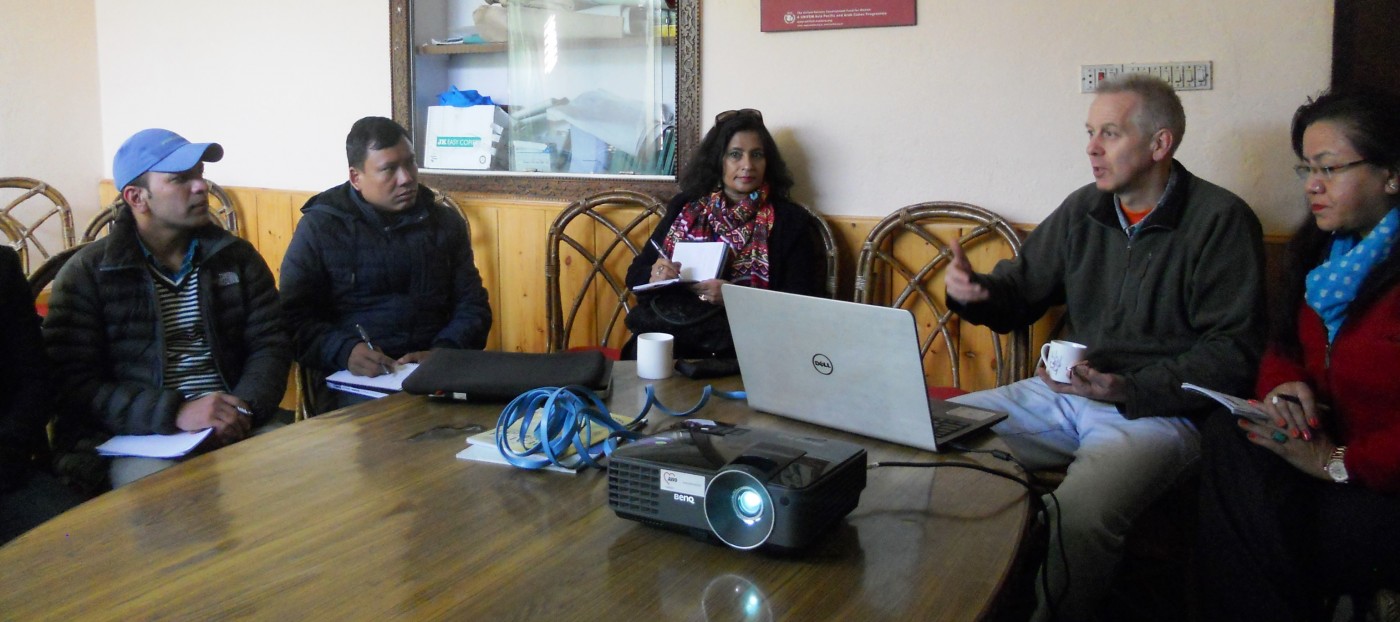


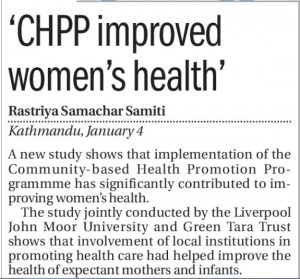

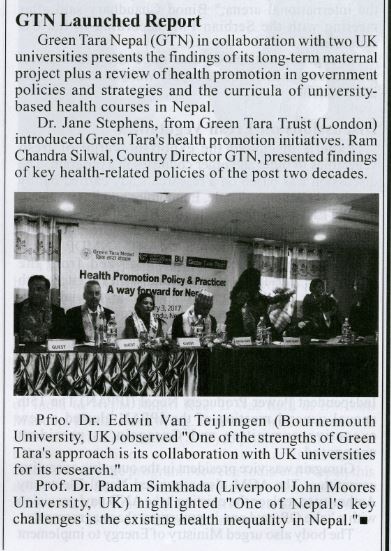
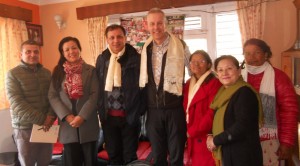
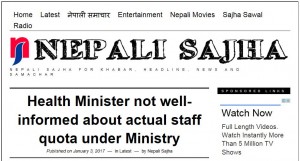
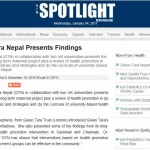

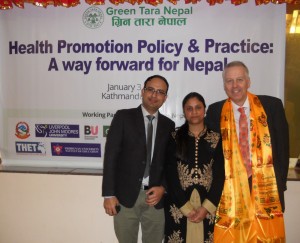
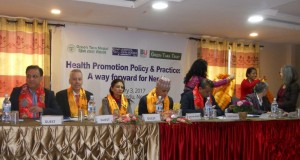
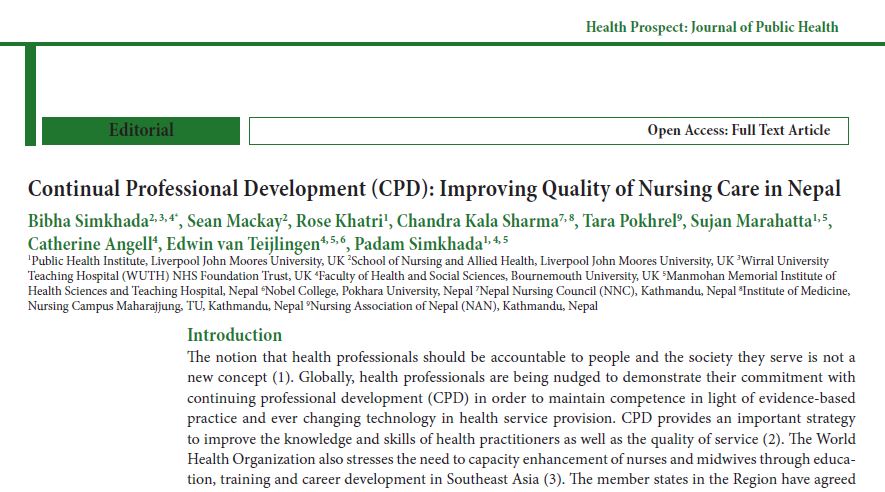

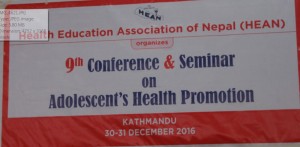 Yesterday Prof. Edwin van Teijlingen from BU’s Centre for Midwifery, Maternal & Perinatal Health (CMMPH) spoke at the 9th Conference and Seminar on Adolescent’s Health Promotion in Kathmandu. This event was organised by the Health Education Association of Nepal (HEAN). The first keynote speech ‘Adolescent’s Health Promotion: Global Perspectives‘ was presented by BU Visiting Faculty Prof. Padam Simkhada (based at Liverpool John Moores University) on behalf of his BU co-authors Dr. Pramod Regmi and Prof. Edwin van Teijlingen. The second keynote speech ‘Global Health Promotion Approach‘ was presented jointly by Prof. van Teijlingen and Green Tara Nepal country director Mr. Ram Chandra Silwal on behalf of their collaborators Prof. Simkhada and Green Tara Trust, UK (Dr. Jane Stephens and Ms. Colette Fanning).
Yesterday Prof. Edwin van Teijlingen from BU’s Centre for Midwifery, Maternal & Perinatal Health (CMMPH) spoke at the 9th Conference and Seminar on Adolescent’s Health Promotion in Kathmandu. This event was organised by the Health Education Association of Nepal (HEAN). The first keynote speech ‘Adolescent’s Health Promotion: Global Perspectives‘ was presented by BU Visiting Faculty Prof. Padam Simkhada (based at Liverpool John Moores University) on behalf of his BU co-authors Dr. Pramod Regmi and Prof. Edwin van Teijlingen. The second keynote speech ‘Global Health Promotion Approach‘ was presented jointly by Prof. van Teijlingen and Green Tara Nepal country director Mr. Ram Chandra Silwal on behalf of their collaborators Prof. Simkhada and Green Tara Trust, UK (Dr. Jane Stephens and Ms. Colette Fanning).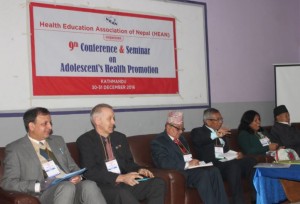

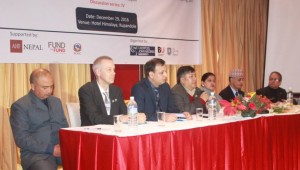
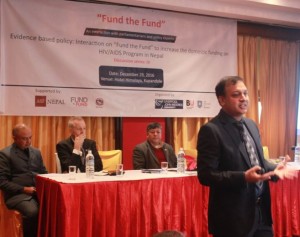
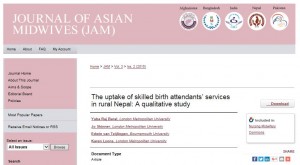


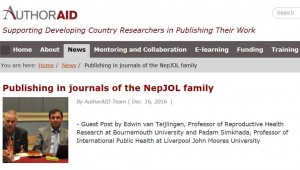
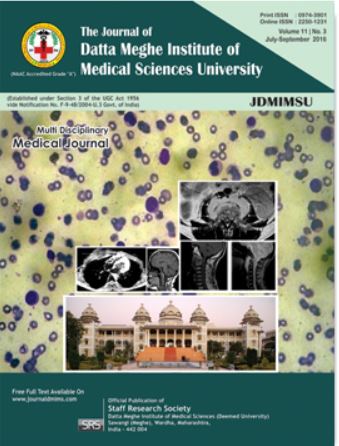
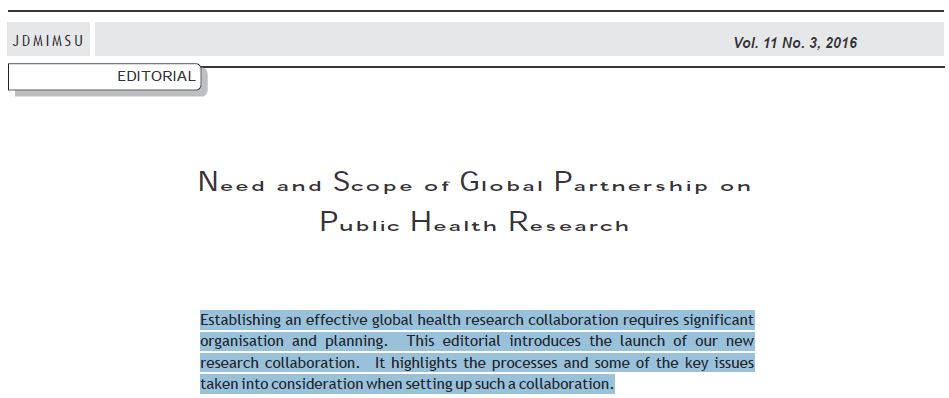
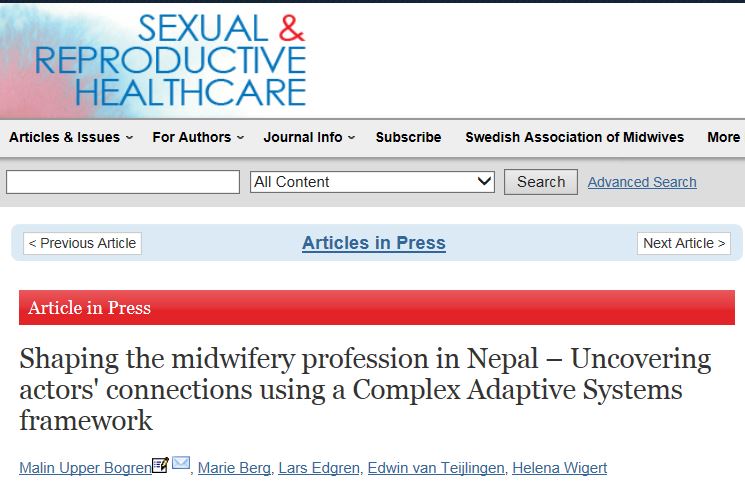
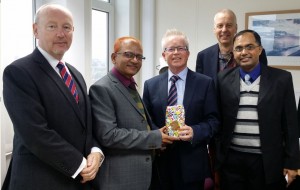
 MMIHS publishes its own journal the
MMIHS publishes its own journal the 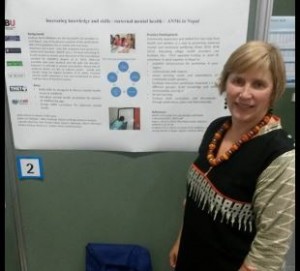
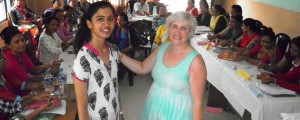

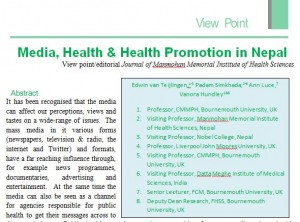

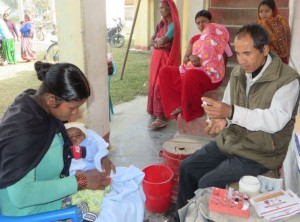











 REF Code of Practice consultation is open!
REF Code of Practice consultation is open! BU Leads AI-Driven Work Package in EU Horizon SUSHEAS Project
BU Leads AI-Driven Work Package in EU Horizon SUSHEAS Project Evidence Synthesis Centre open at Kathmandu University
Evidence Synthesis Centre open at Kathmandu University Expand Your Impact: Collaboration and Networking Workshops for Researchers
Expand Your Impact: Collaboration and Networking Workshops for Researchers ECR Funding Open Call: Research Culture & Community Grant – Apply now
ECR Funding Open Call: Research Culture & Community Grant – Apply now ECR Funding Open Call: Research Culture & Community Grant – Application Deadline Friday 12 December
ECR Funding Open Call: Research Culture & Community Grant – Application Deadline Friday 12 December MSCA Postdoctoral Fellowships 2025 Call
MSCA Postdoctoral Fellowships 2025 Call ERC Advanced Grant 2025 Webinar
ERC Advanced Grant 2025 Webinar Update on UKRO services
Update on UKRO services European research project exploring use of ‘virtual twins’ to better manage metabolic associated fatty liver disease
European research project exploring use of ‘virtual twins’ to better manage metabolic associated fatty liver disease